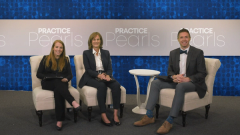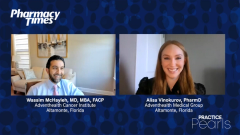
Comparing HR+/HER2- Breast Cancer in Academic and Community Health Settings
Drs Vinokurov and McHayleh discuss how the approach to breast cancer treatment may vary between academic and community health settings.
Episodes in this series

Wassim McHayleh, MD, MBA, FACP: The treatment difference between the academic and community settings depends on the community setting. Not all community settings are the same. [Some] are large health care systems with subspecialists, in which the care is very similar to an academic setting. Those community settings could also serve as teaching institutions with high-profile research protocols, following pathways and guidelines in their treatment. The difference would be with a smaller community setting with small practices. With general oncology covering all diseases and the rapidly evolving field and new treatment paradigms and options, those community settings require more education provided to them in more intensified ways to keep them up to date in their patient care.
Alisa Vinokurov, PharmD: As pharmacists, we stay up to date, specifically in the setting I work in: outpatient oncology clinics. We aren’t the typical community pharmacists people are used to. We work at the top of our license. All the things we’ve mentioned are very new to pharmacy. Pharmacy used to be medication management and verifying orders. But now, as we’re practicing at the top of our license, it’s almost our responsibility to be aware of the up-and-coming trials, the updates to treatment guidelines, and knowing the recommendations for all these cancer types.
Our institution holds conferences. This past weekend, we had an ASCO [American Society of Clinical Oncology] Direct conference. Everybody gathers from the oncology field—nurses, midlevel [professionals], pharmacists, physicians—and sees what the new breakthroughs are in this field. Because we work closely with oncologists who love to teach, we learn a lot from them, and we appreciate everything we learn along the way with them.
Transcript edited for clarity.
Newsletter
Stay informed on drug updates, treatment guidelines, and pharmacy practice trends—subscribe to Pharmacy Times for weekly clinical insights.



























